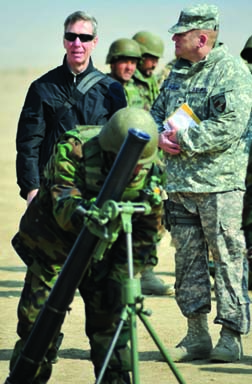February 17, 2011
A correction has been appended to this article.
 Iraq-Afghanistan visit: Congressman Steve Lynch observes training of Afghan National Army recruits. Congressman Stephen Lynch said this week that he remains optimistic about the pace of the draw-down of U.S. troops in Iraq.
Iraq-Afghanistan visit: Congressman Steve Lynch observes training of Afghan National Army recruits. Congressman Stephen Lynch said this week that he remains optimistic about the pace of the draw-down of U.S. troops in Iraq.
Speaking to the Reporter by phone this week after stepping off the floor of the House, Lynch said the U.S. has 48,000 troops left in Iraq, down from 165,000 two years ago. He added that the cost of the war to the U.S. will be $6 billion a year by December, down from a bill of $10 billion a month at the war’s peak.
“That’s a considerable improvement,” he said. Lynch voted in favor of the invasion of Iraq in 2002.
A South Boston Democrat whose House district includes part of Dorchester, Lynch quietly made his thirteenth visit to Iraq earlier this month as part of a Congressional delegation that visited Afghanistan and Pakistan as well. Darrell Issa, a California Republican who chairs the Oversight Committee that Lynch sits on, went along on the trip.
Lynch is also a co-chair of a bipartisan task force on terrorist financing, which he said is investigating a bank in Kabul, Afghanistan. “I think as big as a threat as the Taliban is, my takeaway is corruption is running a close second as a threat to the Afghan government,” he said, declining to go into further detail because the investigation is ongoing and classified.
The delegation had planned to stop in Egypt, but State Department officials advised against the visit in view of the recent unrest in that country. “When we landed in Pakistan, things started to unravel [in Egypt],” Lynch recalled. “The police in Egypt walked off the job, basically, so the security situation continued to deteriorate.”
In Iraq, “[w]e saw a lot of Iraqi government responsibility being shouldered there,” Lynch said, adding that much of the security appeared to be handled by Iraqi police and the national army.
“There’s still sporadic violence, no question. But most of that is by Ba’athist and terrorist elements against the Iraqi security forces,” he said, referring to the regime that was tossed out of power by U.S. forces. “They seem to be handling it pretty well.”
Lynch and the delegation met with Iraqi President Jalal Talabani, whose son is expected to meet with Lynch in Washington soon. The delegation also met with Iraq’s speaker of the House and a council of ministers.
“We’re engaged in a Congress-to-Congress dialogue, trying to help them with some governance issues,” said Lynch, who also represents Needham, Brockton, Braintree and Randolph, among other cities and towns, as part of the Ninth Congressional District.
The delegation also visited Afghanistan’s Kandahar province, where most of the insurgency, made up of Al Qaeda and Taliban fighters, is located. They visited the training center for the Afghani army and the border patrol. They also met with Afghan elders in villages previously controlled by the Taliban.
This was Lynch’s eighth visit to that country where, he said, he met with large contingent of soldiers from Massachusetts, including some from South Boston, Worcester, Fall River, New Bedford and Taunton.
“They’re just doing tremendous work,” he said. “They are true American heroes.”
CORRECTION: Due to an editing error, the article misstated the cost of the Iraq war. The cost will be $6 billion a year by December 2011.
Topics:


